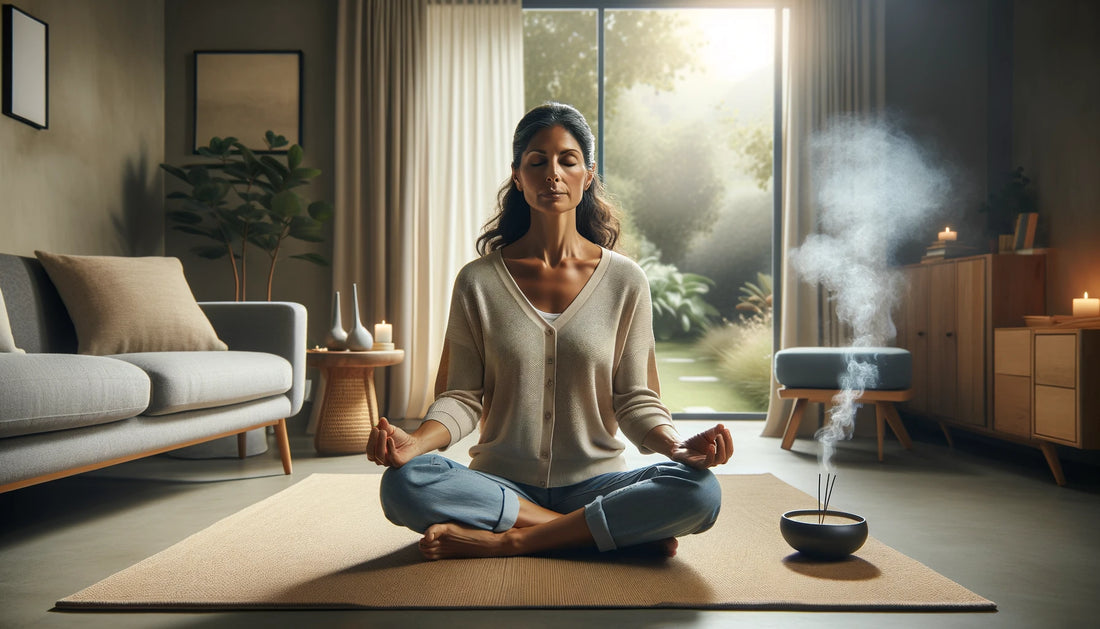If you're just starting, learning how to meditate at home can be the first step toward achieving a greater sense of peace and balance.
What is Meditation and How Can Beginners Practice It at Home?
Meditation refers to a variety of practices that involve training your mind to focus and redirect your thoughts. For beginners, the practice can start in the comfort of your own home, requiring no special equipment—just a few minutes and a quiet space. The essence of meditation for beginners lies in its simplicity; it can start with focusing on your breath, gradually moving towards more structured techniques as you become more comfortable with the practice.
Types of Meditation
While there are many types of meditation, beginners might find it easier to start with a few basic forms:- Mindfulness Meditation: This involves paying attention to your thoughts as they pass through your mind without judgment. View my other blog article here.
- Concentration Meditation: This requires focusing on a single point, which could be a sound, phrase, or repeated word.
- Breathing Meditation: This focuses on inhaling and exhaling, which helps in regulating the mind and body connection.
Understanding these types can help you choose which might work best for you as you begin your meditation journey.
How to Breathe When Meditating for Beginners
Proper breathing is fundamental in meditation. The most basic technique to start with is diaphragmatic breathing, which involves deep, even breaths from the diaphragm. Here’s how to do it:- Find a Comfortable Position: Sit or lie in a comfortable position. You can sit on a chair, cross-legged on the floor, or even lie down.
- Close Your Eyes: This helps minimize external distractions.
- Breathe Deeply: Inhale slowly through your nose, allowing your chest and lower belly to rise as you fill your lungs. Exhale slowly through your mouth or nose.
- Focus on Your Breath: Pay attention to the sensation of the air moving in and out of your body. If your mind wanders, gently redirect it back to your breath.
The Best Breathing Technique for Meditation
While several techniques can be effective, one of the best and easiest for beginners is the 4-7-8 Breathing Technique:- Inhale through your nose for 4 seconds.
- Hold your breath for 7 seconds.
- Exhale completely through your mouth for 8 seconds.
This method helps reduce anxiety and can aid in falling asleep, which is perfect for those who are also learning how to meditate in bed.
How to Meditate in Bed for Beginners
Meditating in bed can be a relaxing way to end the day and prepare for sleep. Here’s a simple method:- Prepare Your Space: Ensure your bedding is comfortable and the room temperature is to your liking.
- Lie Down: Lie on your back with your hands by your sides or on your stomach.
- Breathe Deeply: Use the 4-7-8 breathing technique or another deep breathing method.
- Clear Your Mind: Focus on your breath and try to clear your mind of distractions and worries.
How to Meditate for Anxiety and Stress
To specifically address anxiety and stress through meditation:- Use Guided Meditation: Start with guided sessions that can help you focus and reduce anxiety.
- Incorporate Mindfulness: Pay attention to the present moment without judgment, which can reduce stress.
- Practice Regularly: Consistency is key in seeing the benefits of meditation.
You can also refer to my article: Techniques for Stress Reduction.
Breathwork Techniques for Enhanced Relaxation
Breathwork can significantly enhance your meditation experience, involving more specific patterns and techniques that can vary in intensity and purpose. Box Breathing, for example, involves inhaling, holding, and exhaling for equal counts of four, which is excellent for stress management and concentration.Zen Breathing Techniques
Zen meditation, or Zazen, involves observing the breath and posture with mindfulness. Here’s a basic approach:- Sit upright in a comfortable position.
- Focus on your breath, but instead of manipulating it, just observe it as it is, noticing the natural inhalation and exhalation patterns.
- Acknowledge wandering thoughts, but return your focus gently to your breathing.
Meditation Benefits: Why You Should Start Today
The benefits of meditation are vast, ranging from improved mental clarity and stress reduction to enhanced emotional health and better sleep. Regular practice can also help manage symptoms of anxiety and depression, making it a valuable tool for mental and physical well-being.
By incorporating these techniques and understanding the types of meditation, their benefits, and specific methods like Zen and breath-focused practices, you can start your journey toward a more peaceful and balanced life right in your own home. Whether before bed or first thing in the morning, meditation can provide a quiet refuge in a busy world.

